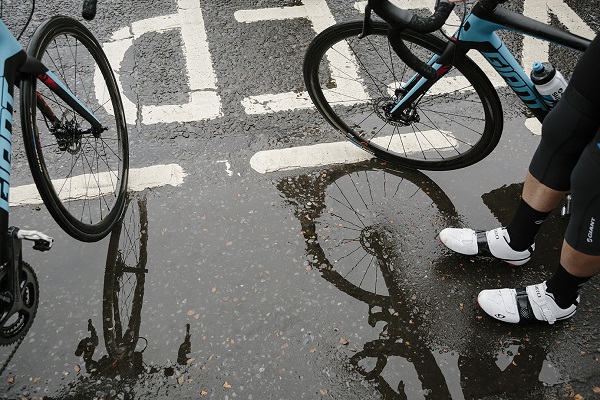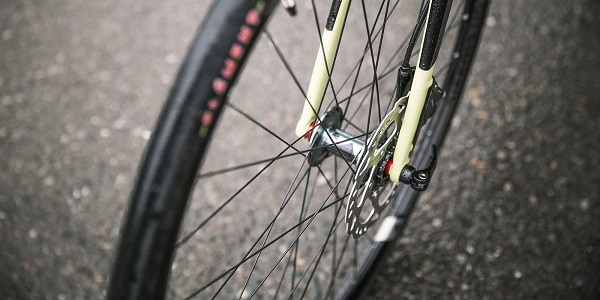
Many people think that rain is a good thing. It’s a natural phenomenon that has been around since the beginning of time. So what’s wrong with rain? Nothing! Rain is an important part of life. It’s a necessary element for the survival of all living things. However, many people don’t realize that rain can also be a big problem for their bikes. If you’re planning on riding your bike through a downpour, you need to know about the potential problems that rain can cause for your bike.
Can rain affect bike brakes?
Rain does not affect bike brakes in the same way that it affects other brake parts. Brakes work by using pads to stop the bike. The pads are able to work well in wet conditions because the water cools them down. You can use the mountain bike disc brake kit.

In dry conditions, they can become very hot and start to wear more quickly. When they get too hot, they can start to melt or become damaged. This is the reason why you see people with wet brakes on wet days. The good news is that you do not need to worry about your brakes getting damaged if you are riding in wet conditions. Rain can affect how the brakes work. If you ride a lot in wet conditions, you will notice that your brake pads seem to get wet. If this happens, then you need to take some extra care to keep your brakes working properly. Keep reading https://greateryellowstonescience.org/is-a-bike-trainer-good-exercise/
Here are some things you can do to ensure that your brakes work well in wet weather:
Use a Brake Fluid That Is Waterproof
If you are going to be riding in wet weather, then you should always use a brake fluid that is waterproof. There are many different types of brake fluids. Each one has different properties. Some of them are more resistant to water than others. If you have ever noticed that your brake pads are wet when you are riding in wet conditions, then this could mean that the brake fluid that you are using is not as waterproof as it should be. It is very important that you find out which brake fluid will work best for your specific needs and that you choose one that is waterproof.
Keep Your Brakes Clean
If you ride in wet conditions often, then you need to make sure that you keep your brakes clean. This means that you should wipe off the brake pads with a rag or towel after every ride. You can also spray them with a brake cleaner to keep them looking good. You do not want to get into the habit of leaving dirty brake pads on your bike. When you leave your brakes dirty, this can lead to them wearing out more quickly. If you have any problems with your brakes, then you should clean them as soon as possible.
Tips To Keep Your Bicycle Brakes From Getting Wet
- If you have a bike that has mudguards on it, you should always keep them clean. Mudguards prevent dirt from getting into the wheel rims and the brake pads. This is important as it prevents damage to your brakes.
- When you’re cleaning your bike, make sure you’re not using a rag that has oil or grease on it. This could ruin your brake pads.
- If you live in a place where it rains a lot, you should keep your bike inside during the rain. This way, you won’t get any water on your brakes.
- If you’re riding your bike outside, make sure you clean your bike before going out. This will make sure you don’t get any water on your brakes.
- If you’re planning to ride your bike in a place where there’s a lot of mud, you should use mudguards. This will prevent you from getting mud on your wheels and on your brakes.
- You should also make sure your bike is well-maintained. This includes checking the tires and the brake pads.
- When it comes to cleaning your bike, you should always wipe it down with a dry rag. This will help keep the dirt off of your bike.
- If you have a bike that has mudguards, you should always keep them clean. This will prevent dirt from getting into the wheel rims and the brake pads.
Tricks of riding in the rain
- Be prepared: Don’t just show up at the office in the rain with no umbrella. Take the time to prepare before you ride. This will help you avoid getting wet, and it will also save you money. You’ll be able to avoid buying an umbrella, and you won’t have to pay to dry your clothes after you get them wet.
- Dress appropriately: You’ll want to wear clothes that are appropriate for the weather and that will keep you dry. You’ll want to wear waterproof clothing, and you’ll want to wear a hat and gloves.
- Keep your gear in a waterproof bag: You’ll want to take your bike and your gear in a waterproof bag. You’ll also want to make sure that your bike is properly secured.
- Avoid the wind: If the rain is coming in sideways, you’ll want to avoid riding in it. You’ll also want to avoid riding in gusts of wind. This will make it harder for you to stay on your bike.
- Ride slowly: You’ll want to ride slowly when you ride in the rain. This will help you avoid getting wet.
- Make sure you have the right equipment: You’ll want to make sure that you have the right equipment for the weather. You’ll want to make sure that you have a helmet and that you have a jacket and a raincoat.
- Use your headlight: You’ll want to make sure you have a headlight on your bike when you ride in the rain. This will help you see where you’re going.
- Keep an eye on your speed: You’ll want to keep an eye on your speed when you ride in the rain. If you go too fast, you’ll risk getting wet.
- Keep your bike upright: You’ll want to make sure that you keep your bike upright when you ride in the rain. You’ll want to make sure that your feet are securely in place and that you don’t have any loose objects around your bike.
- Keep your bike dry: You’ll want to make sure that you keep your bike dry. You can use a waterproof bag to keep it dry. You’ll also want to make sure that you wipe down your bike before you ride in the rain.
In conclusion, if you are experiencing any type of brake issue, make sure to test the brakes for proper function. If you find that your brakes are not working correctly, you should take the time to check the brake pads for wear, inspect the calipers for rust, and check the brake cables for fraying.
